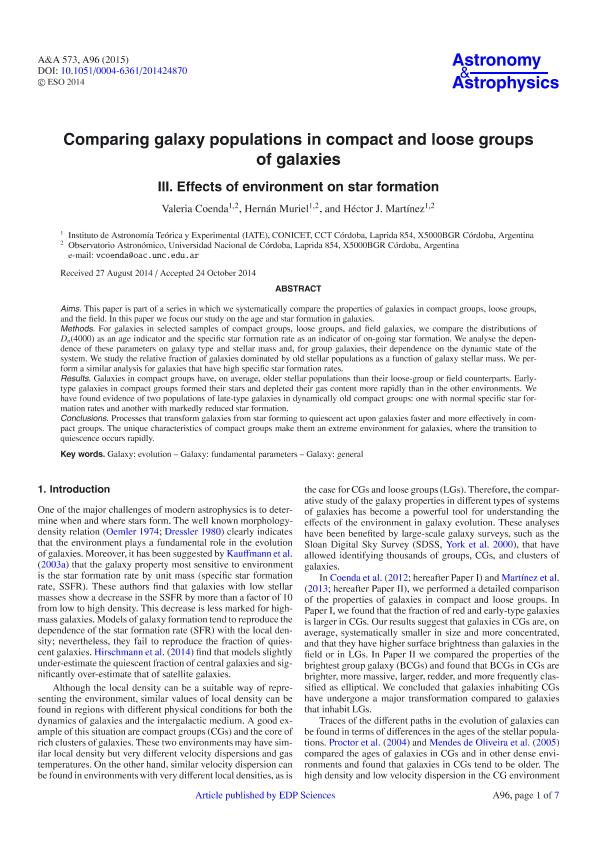Mostrar el registro sencillo del ítem
dc.contributor.author
Coenda, Valeria

dc.contributor.author
Muriel, Hernan

dc.contributor.author
Martinez Atencio, Hector Julian

dc.date.available
2018-02-28T18:42:48Z
dc.date.issued
2015-01
dc.identifier.citation
Coenda, Valeria; Muriel, Hernan; Martinez Atencio, Hector Julian; Comparing galaxy populations in compact and loose groups of galaxies III. Effects of environment on star formation; EDP Sciences; Astronomy and Astrophysics; 573; 1-2015; 1-7; A96
dc.identifier.issn
0004-6361
dc.identifier.uri
http://hdl.handle.net/11336/37427
dc.description.abstract
Aims. This paper is part of a series in which we systematically compare the properties of galaxies in compact groups, loose groups, and the field. In this paper we focus our study on the age and star formation in galaxies. Methods. For galaxies in selected samples of compact groups, loose groups, and field galaxies, we compare the distributions of Dn (4000) as an age indicator and the specific star formation rate as an indicator of on-going star formation. We analyse the dependence of these parameters on galaxy type and stellar mass and, for group galaxies, their dependence on the dynamic state of the system. We study the relative fraction of galaxies dominated by old stellar populations as a function of galaxy stellar mass. We perform a similar analysis for galaxies that have high specific star formation rates. Results. Galaxies in compact groups have, on average, older stellar populations than their loose-group or field counterparts. Early-type galaxies in compact groups formed their stars and depleted their gas content more rapidly than in the other environments. We have found evidence of two populations of late-type galaxies in dynamically old compact groups: one with normal specific star formation rates and another with markedly reduced star formation. Conclusions. Processes that transform galaxies from star forming to quiescent act upon galaxies faster and more effectively in compact groups. The unique characteristics of compact groups make them an extreme environment for galaxies, where the transition to quiescence occurs rapidly.
dc.format
application/pdf
dc.language.iso
eng
dc.publisher
EDP Sciences

dc.rights
info:eu-repo/semantics/openAccess
dc.rights.uri
https://creativecommons.org/licenses/by-nc-sa/2.5/ar/
dc.subject
Galaxy: Evolution
dc.subject
Galaxy: Fundamental Parameters
dc.subject
Galaxy: General
dc.subject.classification
Astronomía

dc.subject.classification
Ciencias Físicas

dc.subject.classification
CIENCIAS NATURALES Y EXACTAS

dc.title
Comparing galaxy populations in compact and loose groups of galaxies III. Effects of environment on star formation
dc.type
info:eu-repo/semantics/article
dc.type
info:ar-repo/semantics/artículo
dc.type
info:eu-repo/semantics/publishedVersion
dc.date.updated
2018-02-28T14:28:35Z
dc.journal.volume
573
dc.journal.pagination
1-7; A96
dc.journal.pais
Francia

dc.journal.ciudad
Paris
dc.description.fil
Fil: Coenda, Valeria. Consejo Nacional de Investigaciones Científicas y Técnicas. Centro Científico Tecnológico Conicet - Córdoba. Instituto de Astronomía Teórica y Experimental. Universidad Nacional de Córdoba. Observatorio Astronómico de Córdoba. Instituto de Astronomía Teórica y Experimental; Argentina
dc.description.fil
Fil: Muriel, Hernan. Consejo Nacional de Investigaciones Científicas y Técnicas. Centro Científico Tecnológico Conicet - Córdoba. Instituto de Astronomía Teórica y Experimental. Universidad Nacional de Córdoba. Observatorio Astronómico de Córdoba. Instituto de Astronomía Teórica y Experimental; Argentina
dc.description.fil
Fil: Martinez Atencio, Hector Julian. Consejo Nacional de Investigaciones Científicas y Técnicas. Centro Científico Tecnológico Conicet - Córdoba. Instituto de Astronomía Teórica y Experimental. Universidad Nacional de Córdoba. Observatorio Astronómico de Córdoba. Instituto de Astronomía Teórica y Experimental; Argentina
dc.journal.title
Astronomy and Astrophysics

dc.relation.alternativeid
info:eu-repo/semantics/altIdentifier/doi/http://dx.doi.org/10.1051/0004-6361/201424870
dc.relation.alternativeid
info:eu-repo/semantics/altIdentifier/url/https://www.aanda.org/articles/aa/abs/2015/01/aa24870-14/aa24870-14.html
dc.relation.alternativeid
info:eu-repo/semantics/altIdentifier/url/https://arxiv.org/abs/1410.7780
Archivos asociados
